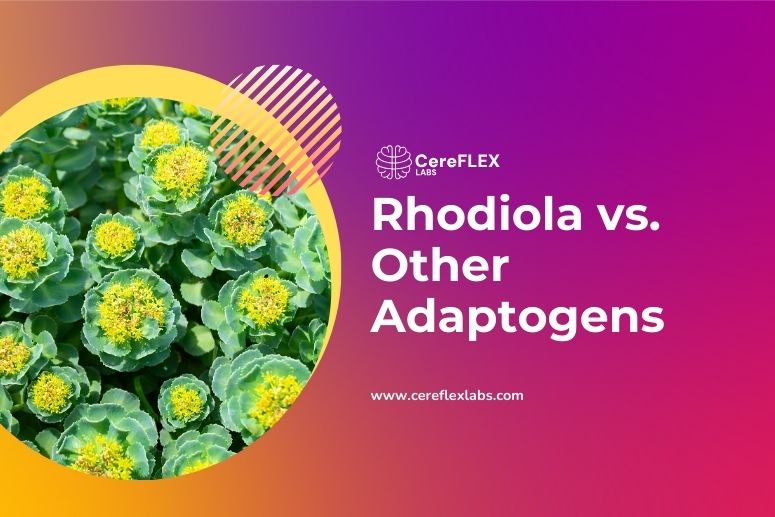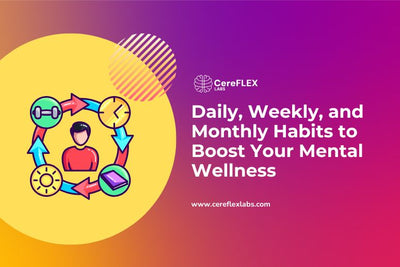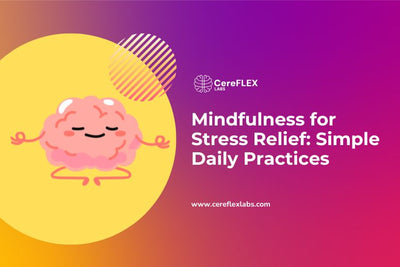Adaptogens are natural herbs that help the body cope with stress reduction, improve energy levels, and sharpen mental clarity. Among them, Rhodiola rosea stands out for boosting performance and reducing mental fatigue.
But how does it compare to other popular adaptogens like Ashwagandha, Holy Basil, Bacopa monnieri, and Ginseng—each known for benefits such as hormonal balance, cognitive support, and immune health?
This guide compares Rhodiola with these powerful herbs to help you choose the right adaptogen based on your personal health goals, whether you’re looking to reduce stress, improve focus, or boost your physical stamina.

What are adaptogens?
Adaptogens are natural substances—typically herbs, roots, or mushrooms—that help the body adapt to physical, emotional, and environmental stress. Rather than targeting a single symptom, adaptogens work to restore balance across the body’s systems, improving overall resilience.
For a plant to qualify as an adaptogen, it must meet three specific criteria:
- It must be safe to use at regular doses.
- It should help the body handle different types of stress—whether physical, chemical, or biological.
- It must support balance by regulating body functions, not by overstimulating them.
General Benefits of Adaptogens
Adaptogenic herbs have been traditionally used for centuries, and modern research is starting to validate many of their benefits. Here are four key ways they may support your health:

Stress Regulation
Adaptogens help the body regulate its stress response by balancing cortisol levels. This makes it easier to manage anxiety, fatigue, and tension. A 2021 review suggests that herbs like ginseng and Rhodiola rosea can reduce chronic fatigue while improving brain function and immune support.1
Energy and Stamina
Many adaptogens, including Rhodiola and ginseng, are recognized for their energy boosting properties. These herbs can help reduce burnout, support muscle endurance, and promote healthy energy metabolism. This makes them popular among athletes looking for natural performance enhancers.2
Immune Support
Adaptogens like astragalus and Holy Basil (Tulsi) are believed to strengthen the immune system. Panax ginseng, in particular, has been studied for its role in supporting immune support by regulating immune cell activity and helping the body respond to infections and inflammation.3
Cognitive Support
Certain adaptogens, such as Rhodiola and Bacopa Monnieri, are known to enhance cognitive function. They may help reduce brain fog, improve memory, and boost mental clarity—especially in times of stress or fatigue. Clinical research shows that Rhodiola extract (SHR-5) may improve attention and mental performance in both everyday and high-stress environments.4
Rhodiola Rosea Overview and Benefits
Rhodiola rosea is a flowering herb native to cold, mountainous regions like Siberia and the Arctic. It has a long history of use in traditional Russian and Scandinavian medicine, where it was valued for enhancing stamina, fighting fatigue, and supporting mental performance in harsh conditions.

May Help Decrease Stress
Rhodiola is classified as an adaptogen, meaning it helps your body respond to physical and emotional stress. Research shows that taking Rhodiola during stressful periods may ease symptoms of burnout. In one study, participants taking 400 mg daily for 12 weeks reported significant improvements in stress and low mood linked to burnout.5
May Improve Fatigue
Fatigue can stem from stress, lack of sleep, or mental strain. Rhodiola has shown promise in helping the body manage fatigue. In a study involving individuals with chronic fatigue, daily supplementation with 400 mg of Rhodiola for eight weeks improved stress levels, energy, focus, and quality of life. Benefits were noticeable within the first week.6
Can Support Cognitive Function
Rhodiola may help protect the brain from cognitive decline. Its antioxidant properties help reduce oxidative stress, which can damage brain cells and contribute to conditions like Alzheimer’s disease. While more research is needed, early findings suggest Rhodiola may support mental clarity and long-term brain health.7

Might Improve Exercise Performance
Animal studies indicate that Rhodiola may improve physical endurance by enhancing muscle power and reducing fatigue. In one study, rats given Rhodiola alongside maral root showed improved strength and recovery after resistance training. Human research is still limited, but these findings are promising for athletes and active individuals.8
May Help Manage Diabetes
In animal studies, salidroside—an active compound in Rhodiola—appeared to protect insulin-producing cells in diabetic mice. This suggests potential for supporting blood sugar management. However, human studies are needed to confirm its effectiveness for diabetes care.9
How Rhodiola Works in the Body
Rhodiola supports health through multiple biological mechanisms:
- Neurotransmitter Regulation: It helps balance serotonin and dopamine, two chemicals that influence mood, motivation, and focus.
- Cortisol Modulation: By regulating the hypothalamic-pituitary-adrenal (HPA) axis, it helps manage the body's stress response.
- Energy Metabolism: Rhodiola may boost cellular energy production by enhancing ATP generation, which is vital for physical and mental performance.
Who Should Consider Using Rhodiola Rosea
Rhodiola rosea offers targeted benefits for various lifestyles and wellness goals. It may be particularly helpful for:
✔ Professionals under high stress who need sustained mental focus and reduced burnout.
✔ Athletes and active individuals looking to boost endurance and improve recovery.
✔ Adults seeking cognitive support, including students or older individuals experiencing mild cognitive decline.
How Rhodiola Compares to Other Adaptogens
Rhodiola rosea is a top choice for boosting energy and mental clarity, but it isn’t the only adaptogen worth considering. Other herbs like Ashwagandha, Holy Basil (Tulsi), Bacopa monnieri, and Ginseng each offer distinct benefits. Choosing the right one depends on your specific wellness goals—whether that’s stress relief, energy support, or hormonal balance.
Below, you’ll find direct comparisons to help you understand when Rhodiola shines and when another adaptogen might serve you better.
Rhodiola Rosea vs. Ashwagandha
While both Rhodiola and Ashwagandha support stress management, they work in different ways and offer unique benefits. Here’s how they compare:
Rhodiola Rosea and Ashwagandha: Key Benefit Comparison |
||
|---|---|---|
|
Aspect |
Rhodiola Rosea |
Ashwagandha (Withania Somnifera) |
|
Primary Benefits |
May Help Support Energy, Mood, Mental Performance, and Libido |
May Help Support Energy, Mood, Mental Performance, and Libido |
|
Mechanism Of Action |
May Help Regulate Cortisol, Support Serotonin and Dopamine Levels, and Assist HPA Axis Function |
May Help Lower Cortisol, Support Thyroid Health, and Enhance GABA Activity |
|
Stress Support Type |
Often Used for Fast-Acting, Energizing Support During Acute Stress and Fatigue |
Often Used for Calming, Restorative Support in Managing Long-Term Stress and Anxiety |
|
Cognitive Effects |
May Provide Quick Mental Clarity and Focus, Often Noticeable Within Hours |
May Support Gradual Improvements in Memory and Concentration Over Several Weeks |
|
Best For |
Individuals Seeking a Short-Term Boost in Mental or Physical Performance |
Individuals Looking for Long-Term Stress Relief and Hormonal Balance Support |
Rhodiola vs. Holy Basil (Tulsi)
Rhodiola rosea and Holy Basil (also known as Tulsi) are both celebrated for their adaptogenic properties, but they serve different needs. Rhodiola is known for its energizing effects, while Holy Basil is more commonly used for calming, immune support, and mood enhancement.
Rhodiola and Holy Basil: Key Benefit Comparison |
||
|---|---|---|
|
Aspect |
Rhodiola Rosea |
Holy Basil (Tulsi) |
|
Mechanism of Action |
May Help Support the Nervous System, Balance Cortisol, and Enhance Serotonin and Dopamine Activity |
May Help Regulate Immune and Endocrine Function, Lower Cortisol, and Reduce Inflammation |
|
Primary Benefits |
May Help Boost Mood, Support Mental and Physical Energy, and Improve Focus |
May Help Reduce Stress, Improve Sleep, Strengthen Immunity, and Support Heart and Liver Health |
|
Energy Impact |
Often Used for Stimulating and Energizing Effects, Especially for Fatigue and Mental Fog |
Often Used for Calming and Restorative Effects, Helping Promote Relaxation and Stress Relief |
|
Best For |
Individuals Seeking an Immediate Boost in Energy and Cognitive Performance Under Pressure |
Those Looking to Manage Chronic Stress, Strengthen Immune Health, and Support Emotional Balance |

Rhodiola vs. Bacopa Monnieri
Both Rhodiola rosea and Bacopa monnieri are popular for supporting brain health, but they offer different benefits. Rhodiola is often chosen for its quick energy and focus support, while Bacopa is traditionally used for long-term memory enhancement and calming effects.
Rhodiola and Bacopa Monnieri: Key Benefit Comparison |
||
|---|---|---|
|
Aspect |
Rhodiola Rosea |
Bacopa Monnieri |
|
Mechanism Of Action |
May Help Support the HPA Axis, Balance Cortisol, and Promote Nervous System Health |
May Enhance Neurotransmitter Activity, Protect Brain Cells, and Support Nervous System Balance |
|
Primary Benefits |
May Help Improve Physical Performance, Support Clean Energy, and Enhance Mental Alertness |
May Support Memory, Learning, Brain Longevity, and Emotional Regulation |
|
Effect On Mood |
Often Used for Uplifting and Energizing Effects, Helping Reduce Stress While Boosting Motivation and Focus |
Often Used for Calming and Grounding Effects, Helping Reduce Anxiety and Promote Emotional Balance |
|
Cognitive Effects |
May Help Increase Mental Performance Under Stress and Fatigue |
May Support Long-Term Memory Retention, Learning Capacity, and Cognitive Health |
|
Best For |
Individuals Seeking Quick Boosts in Energy and Mental Clarity |
Those Looking for Long-Term Cognitive Support and Stress Reduction |
Rhodiola Rosea vs. Ginseng
Rhodiola rosea and Ginseng are two of the most popular adaptogens for boosting energy and overall vitality. While they share some overlapping benefits, their primary effects, mechanisms, and applications differ.
Rhodiola is often chosen for quick mental and physical energy support, while Ginseng is more commonly used for energy boosting and long-term metabolic support.
Rhodiola Rosea and Ginseng: Key Benefit Comparison |
||
|---|---|---|
|
Aspect |
Rhodiola Rosea |
Ginseng (Panax Ginseng / American Ginseng) |
|
Mechanism of Action |
May Help Regulate Serotonin, Dopamine, and Norepinephrine; Support HPA Axis Function |
May Strengthen the Nervous System, Act as an Antioxidant, and Support Dopamine Balance |
|
Mental Benefits |
May Help Reduce Mental Fatigue, Support Focus, and Promote Mood Balance |
May Support Memory, Mood, and Mental Performance Over Time |
|
Physical Benefits |
May Help Boost Physical Endurance, Improve Recovery, and Support High-Altitude Tolerance |
May Help Reduce Inflammation, Support Immunity, Promote Blood Sugar Balance, and Enhance Sexual Health |
|
Best For |
Individuals Seeking Short-Term Support for Energy, Focus, and Stress Resilience |
Those Looking for Long-Term Support for Physical Vitality and Metabolic Support |
Synergistic Effects: Combining Rhodiola with Other Adaptogens
While Rhodiola rosea works well on its own, many people explore its synergistic effects by combining it with other adaptogens to target multiple wellness goals. For example, pairing Rhodiola with Bacopa monnieri may support both focus and memory, while adding Ashwagandha can balance energy with calmness—helping you manage stress without feeling overstimulated.
However, stacking too many stimulating adaptogens, such as Rhodiola and Ginseng, may lead to restlessness or trouble sleeping.
To benefit safely from these synergistic effects, start with small doses and monitor your body’s response. Always consult a healthcare professional if you have medical conditions or take medications.

Practical Usage Guide: How to Safely Use Adaptogens
Choosing the right adaptogen is only part of the equation. Knowing how to use them safely and effectively is just as important. From dosage and timing to cycling and side effects, here are some best practices to consider.
Daily Dosage Recommendations
Start with the lower end of these dosage ranges and increase gradually if needed:
- Rhodiola Rosea: 100-600 mg
- Ashwagandha: Up to 1000 mg
- Bacopa Monnieri: 300-600 mg
- Ginseng: 200 mg to 3 grams
-
Holy Basil (Tulsi): 500 mg
Timing Tips for Best Results
Rhodiola: Take in the morning or early afternoon to avoid overstimulation.
Ashwagandha and Holy Basil: Suitable for morning or evening to promote calm throughout the day.
Bacopa Monnieri: Take with meals to improve absorption.
Ginseng: Best in the morning or midday to boost energy without disrupting sleep.
Cycling for Long-Term Benefits
Adaptogens often work best when used in cycles. Consider taking them for 6 to 12 weeks, followed by a 1 to 2-week break to avoid building tolerance.
Monitoring Side Effects and Interactions
While adaptogens are generally safe for most people, some may experience minor discomforts such as digestive upset, headaches, or trouble sleeping. These potential side effects are more likely if you take high doses or combine several adaptogens at once.
Some adaptogens may also interact with medications, including blood thinners, antidepressants, and thyroid treatments. Always consult a healthcare provider before starting any new supplement routine.
Conclusion: Choosing the Right Adaptogen for Your Health Goals
Choosing the right adaptogen depends on your unique wellness priorities. Rhodiola rosea is ideal for quick mental clarity and energy. Ashwagandha supports long-term stress relief and hormone balance. Bacopa monnieri helps with memory and cognitive longevity, while Holy Basil promotes mood balance and immune health. Ginseng offers broad benefits for energy and metabolic function.
If you’re looking for a simple way to support both mental performance and relaxation, the CereFlex Labs AM/PM Protocol provides a complete daily solution. This two-part system combines adaptogens and antioxidants to help you stay sharp during the day and unwind in the evening:
- AM – Brain Morning Formula: Designed to boost focus, memory, and mental performance.
-
PM – Cognitive Support Evening Formula: Formulated to promote relaxation and overall recovery.
Simplify your adaptogen routine and support your brain health with CereFlex Labs—a trusted solution for balanced mental performance, day and night.






